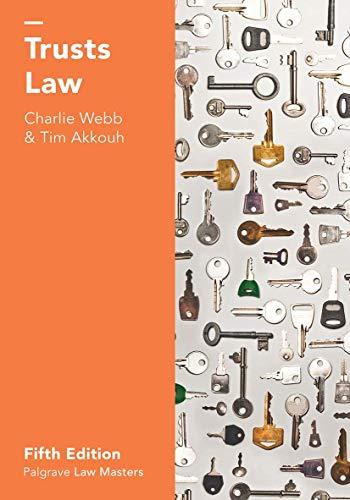Question
Please answer each question in this format! I. JUDGMENT II LEGAL PRINCIPLE A ISSUE (Question of Law) B HOLDING (Answer of Law) III REASONING A
Please answer each question in this format!
I. JUDGMENT
II LEGAL PRINCIPLE A ISSUE (Question of Law) B HOLDING (Answer of Law)
III REASONING A GENERAL ANALYSIS B APPLIED ANALYSIS
IV JUDGMENT
1. 1.Wallace owned 50.25 percent of the shares of Capital Credit & Collection Service (CCCS), with Jones and Gaarde each owning 24.8 percent. Those three shareholders also constituted the board of directors. At a directors' meeting, a majority of the directors-that is, Jones and Gaarde-removed Wallace as president and elected Jones president and Gaarde secretary of the corporation. The following month at a shareholders' meeting at which Gaarde was absent, Wallace voted his majority of the shares to remove Jones and Gaarde as directors of the corporation and to replace them with Roberts and Smith. Under the Oregon Business Corporation Act, a valid shareholders' meeting required a quorum of shares equal to a majority of the shares unless a different quorum is provided in the articles of incorporation. CCCS, however, in its corporate bylaws, had a requirement that a quorum for a shareholder meeting was equal to 100 percent of the shares. Wallace had agreed to the bylaw as a shareholder and director of CCCS. Was the shareholder meeting at which Wallace removed Jones and Gaarde invalid due to the lack of a quorum?
2. The Eliason family owned a majority (5,238) of the 9,990 shares of Brosius-Eliason Co., a building and materials company, with James Eliason (3,928 shares) and his sister Sarah Englehart (1,260) holding the controlling block. The Brosius family owned a total of 3,690 shares. Frank Hewlett owned the remaining 1,062 shares. On July 31, James Eliason executed a proxy giving his daughter, Louise Eliason, authority to vote his shares. Only in the notary public's acknowledgment verifying James's signature did the proxy state that it was irrevocable. The body of the proxy, the part signed by James, did not state it was irrevocable. Two weeks later, James and his sister Sarah made a voting agreement that ensured Eliason family control over the corporation by requiring their shares to be voted as provided in the agreement. The voting agreement was irrevocable because it was coupled with an interest in each other's shares. Soon after, Sarah and Louise had a falling out when Louise tried to assert her family's control of the company. Consequently, Sarah voted her shares with the Brosiuses and Hewlett in violation of the agreement with James. She argued that she was not bound by the voting agreement with James on the grounds that James could not make the agreement because he had given Louise an irrevocable proxy two weeks earlier. Was Sarah right?
3.Furman Nutrients Inc. is a producer of food additives for commercial and consumer use. It is dominant in its field for a number of food additives, including MSG, ETDA, lactic acid, and caramel. For each of the last 30 years, Furman has paid a quarterly dividend to its common shareholders. The annual dividend amount has averaged between 3 and 5 percent of the market price of Furman's common shares. Furman's board of directors decides to reduce the common dividend by 50 percent for the next three years, to about one-half percent of the market price of Furman's common shares. The board wants to use the cash savings to increase Furman's research and development budget as Furman attempts to identify, develop, and produce food additives that are page 44-31"more natural" and meet the "health needs and interests of our industrial and consumer users." Reducing the common share dividend will result in Furman retaining an additional $955 million of earnings and cash over a two-year period. Furman currently has retained earnings of $1.47 billion and cash of $1.26 billion. Its earnings average $610 million annually. Furman expects to spend about an additional $1.17 billion on R&D in the next four years. The board believes that the R&D expenditures will allow Furman to maintain its leadership position in the industry and maintain or increase profits in the long run, a decision backed by a report by Furman's outside financial consultants. Furman's minority shareholders sue to force the board of directors to declare a larger dividend. Will their action be successful?
Step by Step Solution
There are 3 Steps involved in it
Step: 1

Get Instant Access to Expert-Tailored Solutions
See step-by-step solutions with expert insights and AI powered tools for academic success
Step: 2

Step: 3

Ace Your Homework with AI
Get the answers you need in no time with our AI-driven, step-by-step assistance
Get Started


